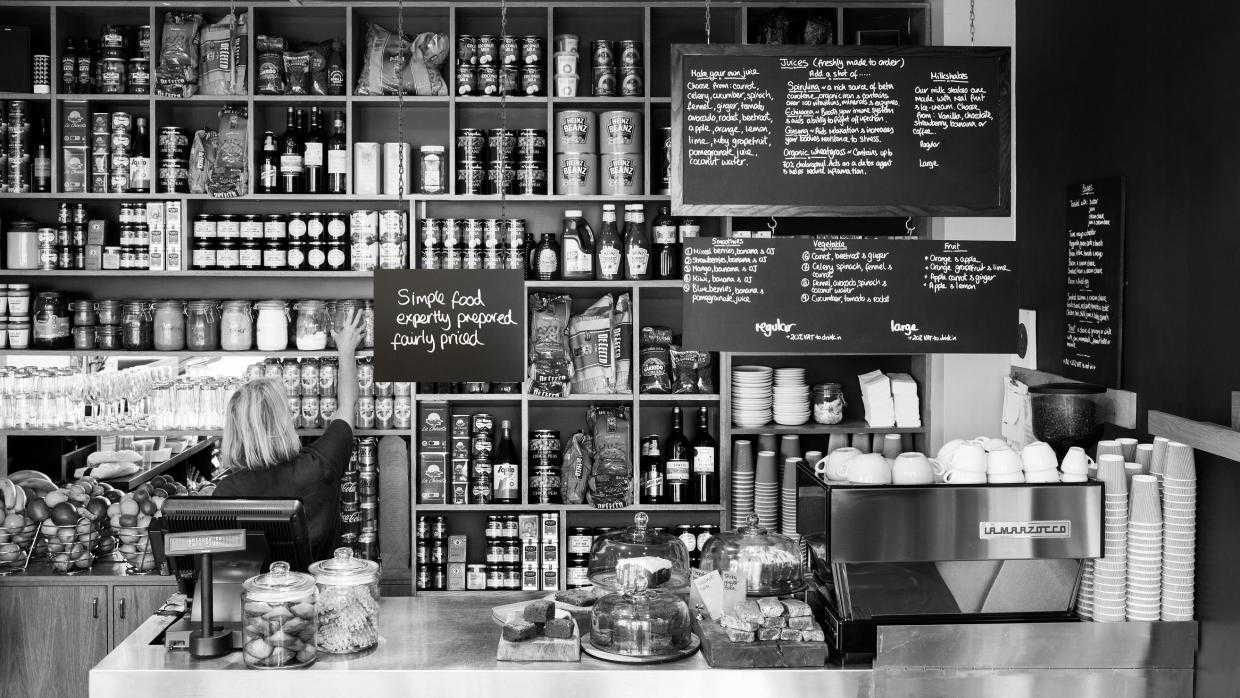LONDON – When Karen started up Café Plum with her husband Ben, their offering of Italian espresso was new to 1997 Fulham. Twenty years later, Café Plum boasts three central London locations and continues to thrive in what has become a highly competitive, multi-billion pound industry.
I caught up with Karen to talk coffee roasts, the importance of location and Café Course, the program she runs to help others get started in the industry.
In 1997 Starbucks wasn’t even around.
My husband and I went to Dorset for a couple of years and handled some tea rooms, then moved back up to London and opened a café with the money we’d saved. We’d both been in the industry for a while so opening our own café felt like a natural progression. We were quite early on I suppose – our café was one of the first to do cappuccinos and espresso based drinks.
The difference was, in those days if you bought a takeaway coffee and you walked down the street with it, you were a little bit of a wanker. That was the perception. For my daughter’s generation – she’s 20– they’ve grown up with it being totally normal to go and buy a coffee.
I think our locations were one of our advantages.
Nowadays, it’s really hard to get a good location because they’ve all been snapped up by people and companies who were here a while ago, like Starbucks. That’s probably the biggest challenge for people here today.
Assuming you’ve got the right location and there are enough customers on your doorstep and you are providing what they want, there’s potential for it to be a cash rich business.
You have to keep very conscious about what’s happening in the market around you.
The café market is very dynamic as people’s tastes are always changing. When we first opened, everyone was drinking an Italian espresso-based coffee. That’s a dark, bitter roast.
There’s been a huge shift in the last ten years to Australian and New Zealand roasts. If you don’t keep on top of things like that, you can easily slip behind.
We started making money from day one and the business grew very quickly.
You buy your bread or coffee at the beginning of the day and you sell it by the end, so you get your return straight away. You don’t have to wait for a middleman.
It’s vital to understand how the figures stack up. Most people who are new to the business will sit in a café, count how many customers come through the door and work out how much it costs to sell a coffee, but they’ve got no idea about all the other costs. People assume that selling coffee’s a really profitable thing to do, but once you take into account staff costs and VAT costs, there’s very little left at the end of the day.
Everybody knows starting a café is hard work, but it was a shock to find out how hard it is.
We were starting at 5 in the morning and finishing at 9 or 10 at night. By the time we came home, there was still the bookkeeping to do. It was seven days a week and there were no holidays. That was a challenge and I was fully expecting hard work, but it was very, very hard work.
Your business is either growing or contracting, it’s never just stable.
You have to stay on the ball and it can seem scary when you first start up.
Some days it would be really quiet, and I’d have a horrible, lurching, panicking feeling of “that’s it, it’s all dried up” and the next day we’d be busy again. I’ve been doing this for twenty years and I still worry that maybe tomorrow no one will walk through the door. It’s quite good in some ways, because it keeps you sharp.
People get romantic about what opening a café is.
People think it’s all about coffee and being creative and chatting to people. It’s superficially sociable, because you say hello to your regulars but that’s as far as it goes. The rest of the time you’re on your own, not really knowing if what you’re doing is good, bad or average.
It can be quite lonely and people don’t expect that. You have people working for you, but you don’t have peers or wider industry support. You don’t chat to other café owners, for instance – they’re not going to give you support and information and help, because it’s pretty much dog-eat-dog on the high street. It can be quite isolating from that perspective.
A lot of people go into the café industry because they’re tired of what they’re doing.
Most people make a complete career change and go into the business without knowing anything about it. That’s part of the reason why I set up our course – I find that people’s perception of what running a café is like and what it’s actually like is worlds apart. People sell their houses and risk everything to open a café, and I genuinely want them to start off on the right footing.
If you look at your motivations and find that you are really passionate about food and coffee then starting up a café is the right move. But don’t forget it’s a business, like any other business – the same as opening an accountant’s or a plumbers’ merchants. At the end of the day, it’s exactly the same thing – it’s just retail.
Kat Haylock
















